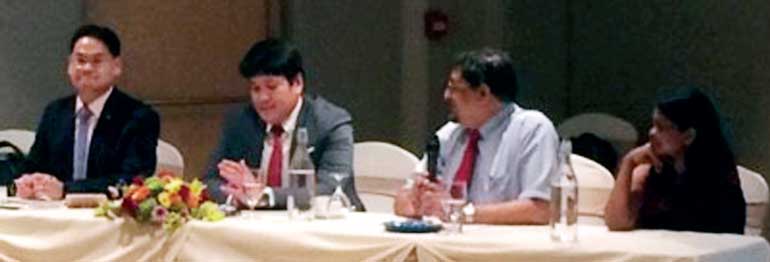Friday Feb 20, 2026
Friday Feb 20, 2026
Thursday, 28 September 2017 00:58 - - {{hitsCtrl.values.hits}}

 Ernst & Young (EY) Sri Lanka hosted its clients to a forum on sharing insights on the practical implementation of new Sri Lanka Accounting Standards. SLFRS 9 – Financial Instruments and SLFRS 15 – Revenue from Contracts which will come into effect 1 January 2018 and SLFRS 16 – Leases which will come into effect 1 January 2019.
Ernst & Young (EY) Sri Lanka hosted its clients to a forum on sharing insights on the practical implementation of new Sri Lanka Accounting Standards. SLFRS 9 – Financial Instruments and SLFRS 15 – Revenue from Contracts which will come into effect 1 January 2018 and SLFRS 16 – Leases which will come into effect 1 January 2019.
The event was attended by Audit Committee Chairpersons, CEOs and CFOs of companies in Sri Lanka. The local leadership of the firm and two area leaders from Singapore, J.A. Chiang and Philippines Aris Malantic addressed the gathering. Ruwan Fernando, the Country Managing Partner of Ernst & Young Sri Lanka welcomed the invitees, highlighting the need for discussion on practical experience at a time when companies are just three months away from implementing two critical standards, SLFRS 9 and SLFRS 15. The banks are at a crucial stage in their SLFRS 9 implementation process. There is no shortage of challenges facing senior management as they work towards balancing the cross functional ownership of the program whilst delivering across risk, finance, business and technology functions.
Assurance Leader of EY Sri Lankan practice, Manil Jayesinghe said: “Under SLFRS 9, the measurement and recognition of expected credit losses on the balance sheet is intended to reflect the pattern of credit deterioration or improvement over the life of the instrument through the designation of a stage. Instruments that have not exhibited significant deterioration are designated as Stage 1. A 12-month expected credit loss is recorded on these instruments. Where there has been significant deterioration in creditor an incurred credit loss, the instrument is reported as Stage 2 and 3 respectively, with lifetime expected losses reported. The new model for impairment is likely to increase provisions of Banks and Finance companies. The increase in provisions will have a direct impact on Tier 1 ratios under Basel III” he warned. The forum also highlighted that SLFRS 16, the new leasing standard will bring about a “right of use asset” on the balance sheets of lessees that may further erode capital, if they were considered as risk weighted assets.
Aris Malantic the ASEAN Financial Accounting Advisory Services (FAAS) partner of EY shared his experience in implementing the new standard in major banks in the Philippines. He noted that Executive level sponsors who take responsibility for the overall project implementation, including maintaining an integrated communication channel across Risk, Finance, Business and Technology are a key success factor in the implementation process. Cohesive and detailed implementation plans that are underpinned by well-structured work streams with defined roles and responsibilities will support the governance of the project. “Financial Statements depict the story of the actions of the business. The collaboration with business cannot be overemphasised in the implementation of SLFRS 9, as this will support the sustainability of the project in the long run,” he said. J.A. Chiang (Asia-Pac Leader, Financial Accounting Advisory Services) highlighted to the audience that SLFRS 16 – Leases will require most lessees to recognise a right of use asset on the balance sheet. The effort in identifying leases in organisations, and capturing data requires changes to current processes and controls.
Addressing a gathering of Audit committee members and CFOs of listed and Specified Business Entities (SBE) in Sri Lanka, the EY team shared their experience in implementing SLFRS 15 – Revenue from Contracts. The core principle of the standard is that an entity will recognise revenue to depict the transfer of promised goods and services to customers in an amount that reflects the consideration to which the entity expects to be entitled in exchange for those goods or services. Although the principle in the standard is logical, application of the standard is extremely complex. Manil said, “Our businesses are used to recording revenue based on the invoice value. The new standard requires you to start recognising revenue based on the contract with the customer. This will cause tremendous pressure on the data capturing ability of current processes.”
Hiranthi Fonseka (Partner Financial Accounting Advisory Services – Sri Lanka) shared experience of EY Sri Lanka in terms of adopting the standard. Many industries such as FMCG, Telecom, manufacturing, tourism etc will have its revenue impacted where third parties are involved in distributing goods and services to the end consumer. The determination of principle and agent is more clarified in the new standard, and entities are compelled to establish transfer of control if the current practice of revenue recognition is to continue. Some of the other industries that have challenges in terms of revenue recognition would be the IT sector, real estate sector, and services sector.
“Certain industries may be severely affected, and others not so, but every company will have to go through the process of evaluation of its contracts under the new principles,” concluded Aris.